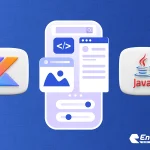Technology has been transforming almost every aspect of life rapidly. If someone talked about ChatGPT, Microsoft CoPilot, or Gemini, nobody would believe that this would be possible in the coming years. Similarly, mobile app development has also seen technological advancements and the future of mobile app development is here. Let’s explore together the future & trends of mobile phone app development.
Prediction and Future of Mobile App Development

New trends and predictions are coming up, and the future of mobile app development is insane as we have never thought about doing Facetime with our loved ones. This tech revolution is insane, however, we have more things to come up, let’s find out what the future will look like.
Ethical AI
AI has been an integral part of mobile app development, it can enhance the experience and automate tasks to enhance the overall functionality. Since AI has become so powerful we have to set an ethical boundary for AI in mobile apps.
AI systems can unintentionally incorporate biases, potentially resulting in unfair outcomes, particularly in applications such as hiring, medical evaluations, and lending. Consequently, future developments are likely to emphasize creating fair and transparent AI solutions to eliminate bias. To build user trust in sensitive areas like banking, finance, and healthcare, the adoption of Ethical AI practices will become a priority.
Also read: The Do’s and Don’ts of Mobile Application Development
AR in Remote Collaboration
While augmented reality (AR) has revolutionized industries like gaming and retail, its potential for enhancing remote collaboration remains largely untapped. In the future, AR will create immersive environments that enable real-time communication and teamwork.
AR-powered mobile apps will play a pivotal role in remote collaboration, especially in sectors such as engineering and architecture. These apps will facilitate interactive workflows by allowing users to manipulate virtual objects in real time.
Inclusive Design
Mobile app development in the coming years will emphasize inclusivity. Future apps are likely to address not only accessibility requirements but also cognitive and sensory needs. Neuro-inclusive designs will take center stage, featuring customizable interfaces, intuitive navigation, and distraction-free modes to ensure a more inclusive user experience.
Behavior Analysis to Enhance Personalized Journey
The evolution of behavioral analytics has demonstrated how apps can analyze user interactions in real time to deliver personalized experiences. In the future, mobile apps will take this further by predicting user behavior, becoming more intuitive, and adapting to habits, preferences, and needs—all without requiring manual input. This level of hyper-personalization will elevate user experiences, driving greater satisfaction and loyalty.
Also read: Six Critical Steps to Build a Mobile App That Shines
Voice & Gesture Outside Assistants
Siri and Alexa have become household names due to their ability to revolutionize user interactions, providing hands-free navigation and intuitive controls. In the future, mobile apps are likely to incorporate voice and gesture recognition, paving the way for more natural and immersive user experiences.
Conclusion
Many experts consider 6G and 7G internet broadband to be the future of mobile phones, but we still believe that customization and a human-centric design approach, personalization will be a much better option. From ethical AI to neuro-inclusive design, the future of mobile app development is more focused on how the apps interact with the users.









